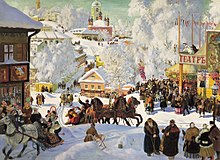04:33
> Agents probed the 18-year-old Khan's alleged repeated communication and conspiracy with an individual whom he believed to be a fighter with Islamic State to obtain weapons, including pipe bombs or pressure-cooker bombs, according to a statement from Arizona Attorney General Mark Brnovich on Thursday.
6 hours later…
10:24

Maslenitsa (Russian: Мaсленица, Ukrainian: Масниця, Belarusian: Масленіца; also known as Butter Week, Crepe week, or Cheesefare Week) is an Eastern Slavic religious and folk holiday, celebrated during the last week before Great Lent, that is, the eighth week before Eastern Orthodox Pascha (Easter).
Maslenitsa corresponds to the Western Christian Carnival, except that Orthodox Lent begins on a Monday instead of a Wednesday, and the Orthodox date of Easter can differ greatly from the Western Christian date.
== Traditions ==
According to archeological evidence from 2nd century A.D. Maslenitsa may...
10:36
Hi, can someone answer this post: ell.stackexchange.com/questions/200116/… (Actually no one has replied to it,yet......................
6 hours later…
16:09
3 hours later…
19:58
20:23
@snailboat Is dive – dived / dove (AmE) – dived a "regular verb"? Or perhaps "slightly irregular"? I'd understand if for analysis' sake you'd adopt a more scalar-like system, but I'm not really sure how to answer this. "The question is, do all regular verbs have the same form for V2 and V3?" Yes, but don't they definitionally? Their question would be okay if they didn't know what regular meant, I think.
20:40
So their question would make sense in a situation in which regular verb denotes verbs which follow another regular pattern; namely, the one in which the preterit and past participle forms don't exhibit syncretism.
21:08
So, being irregular is a binary state. If it differs from the standard pattern at all, it's irregular. Remembering of course that there's a tiny, tiny bit of variation in the standard pattern like doubling of consonants occasionally.
But irregular verbs can be more or less irregular than other irregular verbs. Actually, most irregular verbs are regular under old Germanic verb patterns, either as a weak verb or as one of the several strong verb patterns. Strong verbs form their preterite by vowel shift, and the past participle by a suffix, and sometimes vowel shift as well.
And the vast majority of irregular verbs are only irregular in either preterite or past participle, or both.
1 hour later…
« first day (1361 days earlier) ← previous day next day → last day (2174 days later) »
Transcript for
Mar10
Mar '1911
Mar12
 Language Overflow
Language Overflow
This is the main chat room for ell.stackexchange.com. Welcome!

